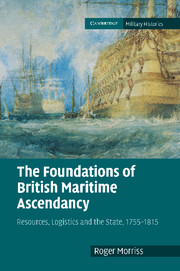Book contents
- Frontmatter
- Contents
- List of tables
- Preface
- Glossary of British weights, measures, casks and money values
- List of abbreviations
- Introduction
- 1 The British state in evolution
- 2 Defence and expansion
- 3 Economy and finance
- 4 Naval growth and infrastructure
- 5 Ordnance and technology
- 6 Manpower and motivation
- 7 Foodstuffs and victualling
- 8 Shipping and transportation
- 9 The supply of land forces overseas
- Conclusion
- Bibliography
- Index
8 - Shipping and transportation
Published online by Cambridge University Press: 10 January 2011
- Frontmatter
- Contents
- List of tables
- Preface
- Glossary of British weights, measures, casks and money values
- List of abbreviations
- Introduction
- 1 The British state in evolution
- 2 Defence and expansion
- 3 Economy and finance
- 4 Naval growth and infrastructure
- 5 Ordnance and technology
- 6 Manpower and motivation
- 7 Foodstuffs and victualling
- 8 Shipping and transportation
- 9 The supply of land forces overseas
- Conclusion
- Bibliography
- Index
Summary
Food, manpower, guns and materials for the maintenance of Britain's armed forces throughout the world could not have been delivered without sea transport. The growth of the shipping industry was fundamental to the expansion of Britain's maritime economy; it was also fundamental to the projection of the British state. A state transport service had taken shape under William III. However, the dissolution of that service in 1717 required the different departments of government that used shipping to hire and manage their own. Added work, competition for ships, differences in terms of hire, weaknesses of control all thereafter complicated the use of shipping by the boards involved. Acute problems were experienced during the American War of Independence and a state transport service was re-instituted at the beginning of the French Revolutionary War. From 1794 the new Transport Board played a central role in Britain's overseas operations, achieving economies and efficiency on a large scale. It chartered shipping according to commercial practices and used it flexibly to suit the requirements of different departments. Key operational roles were performed by agents for transports at the main ports, who prepared and despatched vessels, and by agents who accompanied fleets of transports overseas. Britain's overseas achievements reflected this marriage between a key maritime resource and the state's bureaucracy.
- Type
- Chapter
- Information
- The Foundations of British Maritime AscendancyResources, Logistics and the State, 1755–1815, pp. 321 - 354Publisher: Cambridge University PressPrint publication year: 2010

